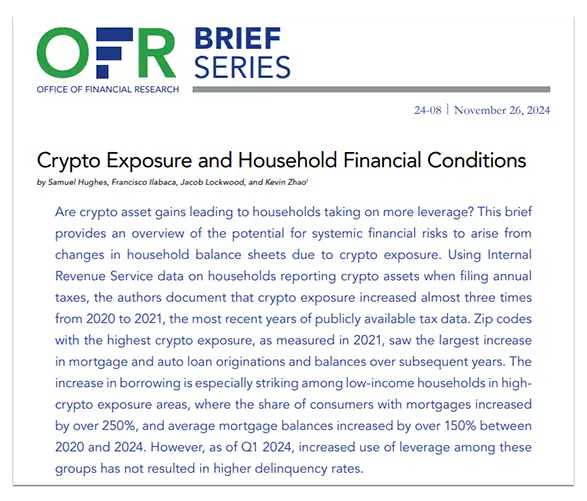The Growing Risks of Crypto Wealth: What the OFR Report Reveals

The post The Growing Risks of Crypto Wealth: What the OFR Report Reveals appeared first on Coinpedia Fintech News
Crypto is growing very fast. From getting banned in many countries to become a major medium of payments in others. It has even started to change how people borrow and spend. A new report from the Office of Financial Research (OFR), published on November 26, 2024, looks at how more people are getting into crypto and what it’s doing to their finances. According to the study, more people are using their crypto profits to take on bigger loans, and that could lead to trouble for some down the road.
What’s Happening with Crypto Borrowing?The OFR report, using data from the IRS, shows that household exposure to crypto has tripled from 2020 to 2021. And it’s not just the wealthy anymore—low-income areas with high crypto activity have seen some huge shifts. For example, mortgage balances for low-income families have shot up by over 150%, and more of these households are taking on mortgages than ever before. Between 2020 and 2024, mortgages in these areas increased by 250%. It’s clear that crypto is pushing people to borrow more.
 The Rise of Borrowing: Mortgages and Loans
The Rise of Borrowing: Mortgages and Loans
The big returns from crypto—like the 300% increase in 2020—have given people the confidence to take on bigger debts. Many are using crypto profits to put down payments on homes, which has caused an increase in mortgage borrowing. The OFR report also mentions that auto loans are rising, but the good news is that delinquency rates haven’t gone through the roof yet.
A new OFR Brief examines the relationship between crypto exposure and the increase in household debt since the COVID-19 pandemic.https://t.co/0h1aCfqhFh
— Office of Financial Research (OFR) (@OFRgov) November 26, 2024But here’s the catch. Some households are borrowing more than they should. They’re pushing their debt-to-income ratios to uncomfortable levels. Right now, things might seem fine with crypto booming, but what happens if the market takes a dive?
Who’s Borrowing the Most?While young people and those in tech-heavy areas have always been big crypto investors, it’s actually low-income households in areas with high crypto activity that are borrowing the most. These families are using their crypto wealth to make big purchases and, in turn, are taking on more debt. Crypto’s value can shoot up fast, but it can also crash just as quickly. The risk? If the market drops, those who’ve borrowed heavily might not be able to keep up with payments.
.article-inside-link { margin-left: 0 !important; border: 1px solid #0052CC4D; border-left: 0; border-right: 0; padding: 10px 0; text-align: left; } .entry ul.article-inside-link li { font-size: 14px; line-height: 21px; font-weight: 600; list-style-type: none; margin-bottom: 0; display: inline-block; } .entry ul.article-inside-link li:last-child { display: none; }- Also Read :
- Vitalik Buterin Sold His Meme Coin Holding, But Why?
- ,
As of early 2024, delinquency rates in high-crypto areas are still pretty low, but that could change. Rising debt in low-income communities could be a problem if crypto prices start to fall. Households that took on big loans to buy homes or cars with crypto profits might struggle to pay them back. If that happens, it could cause bigger problems for their financial future.
Opportunities and RisksThe OFR report shows that crypto can be a great way to build wealth, but it’s also a risk. While using crypto gains to make big investments might seem smart when things are going well, it also leaves households exposed if the market crashes. With rising debt levels, especially in low-income areas, the risk of financial instability is growing. It’s something to keep an eye on as the market continues to change.
